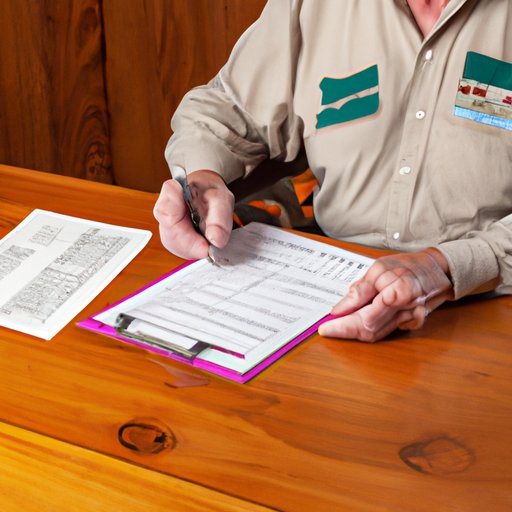I. Introduction
If you’re a travel nurse, you know that tax season can be a daunting task. Filing taxes can be complicated for anyone, but for travel nurses who work in multiple states throughout the year, it can be particularly challenging. This article is here to guide you through the tax filing process, help you understand what expenses you can deduct and how to maximize your returns, and provide you with insights on the best way to file your taxes.
II. Navigating Tax Season: A Guide for Travel Nurses
As a travel nurse, you’ll need to be familiar with the tax requirements for your unique situation. While every travel nurse’s circumstances are different, there are some basic tax concepts that you need to know.
First, it’s important to understand the difference between taxable income and tax-free reimbursements. Your taxable income is the money you earn from your travel nursing job, while tax-free reimbursements cover expenses such as housing, meals, and travel.
As a travel nurse, you may receive tax forms such as W-2 and 1099, depending on how you’re classified. You should review these forms carefully to ensure that you’re accurately reporting your income and expenses.
III. Maximizing your Tax Deductions as a Travel Nurse
One of the benefits of being a travel nurse is that you may be able to take advantage of a variety of tax deductions. Some of the expenses that you can deduct include housing, meals, transportation, and continuing education.
Calculating these deductions can be complex, so it’s important to keep accurate records of all of your expenses throughout the year. You should also familiarize yourself with the rules around each type of deduction to ensure that you’re claiming them correctly.
IV. The Pros and Cons of Filing as an Independent Contractor vs. Employee
When it comes to taxes, the way you’re classified can have a significant impact on your tax bill. As a travel nurse, you may have the option of filing as an independent contractor or employee.
If you’re classified as an independent contractor, you’ll be responsible for paying your own taxes and may be able to deduct more expenses on your tax return. However, you’ll also be responsible for paying self-employment taxes, which can be higher than payroll taxes.
If you’re classified as an employee, your employer will handle your taxes and may provide benefits such as health insurance and retirement plans. However, you may have fewer deductions available to you.
V. The Importance of Keeping Accurate Records for Tax Purposes
Regardless of how you’re classified, it’s essential to keep detailed records of all of your expenses. This includes receipts, mileage logs, and any other documentation that demonstrates that an expense was incurred as part of your travel nursing job.
You should also make sure that you’re organizing these records in a way that’s easy to reference during tax season. This may involve setting up a spreadsheet or using a dedicated expense-tracking app.
VI. A Beginner’s Guide to Filing Quarterly Estimated Taxes
As a travel nurse, you may need to file quarterly estimated taxes. These are payments you make to the government to cover your tax obligations throughout the year.
Estimating your taxes can be challenging, but there are tools and resources available to help you calculate your quarterly payments. It’s important to pay these taxes on time to avoid late payment penalties.
VII. How to Choose the Right Tax Preparer for Travel Nurses
Finally, you may want to consider working with a tax professional who has experience working with travel nurses. There are several types of tax preparers available, including certified public accountants and enrolled agents.
When selecting a tax preparer, you should consider factors such as their credentials, experience, and communication style. It’s also important to maintain accurate records and communicate openly with your tax preparer throughout the year.
VIII. Conclusion
While tax season can be a stressful time for travel nurses, there are steps you can take to make it easier. By understanding the tax requirements for your unique situation, keeping accurate records of your expenses, and working with a tax professional, you can maximize your deductions and ensure that you’re meeting your tax obligations.
Ultimately, if you have any doubt about your taxes, it’s always best to consult with a tax professional. They can provide you with personalized advice and guidance that will help you achieve the best possible outcome.
(Note: Is this article not meeting your expectations? Do you have knowledge or insights to share? Unlock new opportunities and expand your reach by joining our authors team. Click Registration to join us and share your expertise with our readers.)
